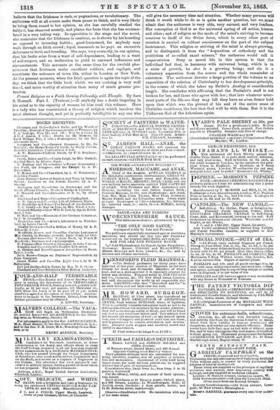Present Religion as a Faith Owning Fellowship with Thought. By
Sara S. Hennell. Part L (Trubner.)—If anybody has a doubt lingering in his mind as to the capacity of woman let him read this volume. Here is a lady who has constructed a theory of religion which involves the most abstract thought, and yet is perfectly intelligible to any one who will give the necessary time and attention. Whether many persons will think it worth while to do so is quite another question, but we must admit that the authoress is very able, very earnest, and very fearless. Her conception of God is as the universal spring of all action, human and other ; and of religion as the mode of the mind's striving to become conscious to itself of the divine force, which in every other part of creation is carried on without consciousness on the part of the subject instrument. This religion or striving of the mind is always growing, and to distinguish it from the "dogmatism of orthodoxy and the positivism of so-called exact science," the authoress would call it comparativism. Daty or moral life in this system is that the individual feel that, in harmony with universal being, which- is in a state of growth, he also is a growing being; and sin is a voluntary separation from the source and the whole remainder of existence. The authoress devotes a large p ortion of the volume to an exposition of the relation of Christianity to her development-principle, in the course of which she takes up Butler's Analogy at considerable length. She concludes with affirming that the Psalmist's staff is not broken for her, and those who agree with her ; that into whatever utter- most parts of the life-sea they may fall they have an even firmer hold upon that which was the ground of his and of the entire mass of Christian confidence, the fact that God will be with them. But it is the Unknown God of the Athenians again.






























 Previous page
Previous page